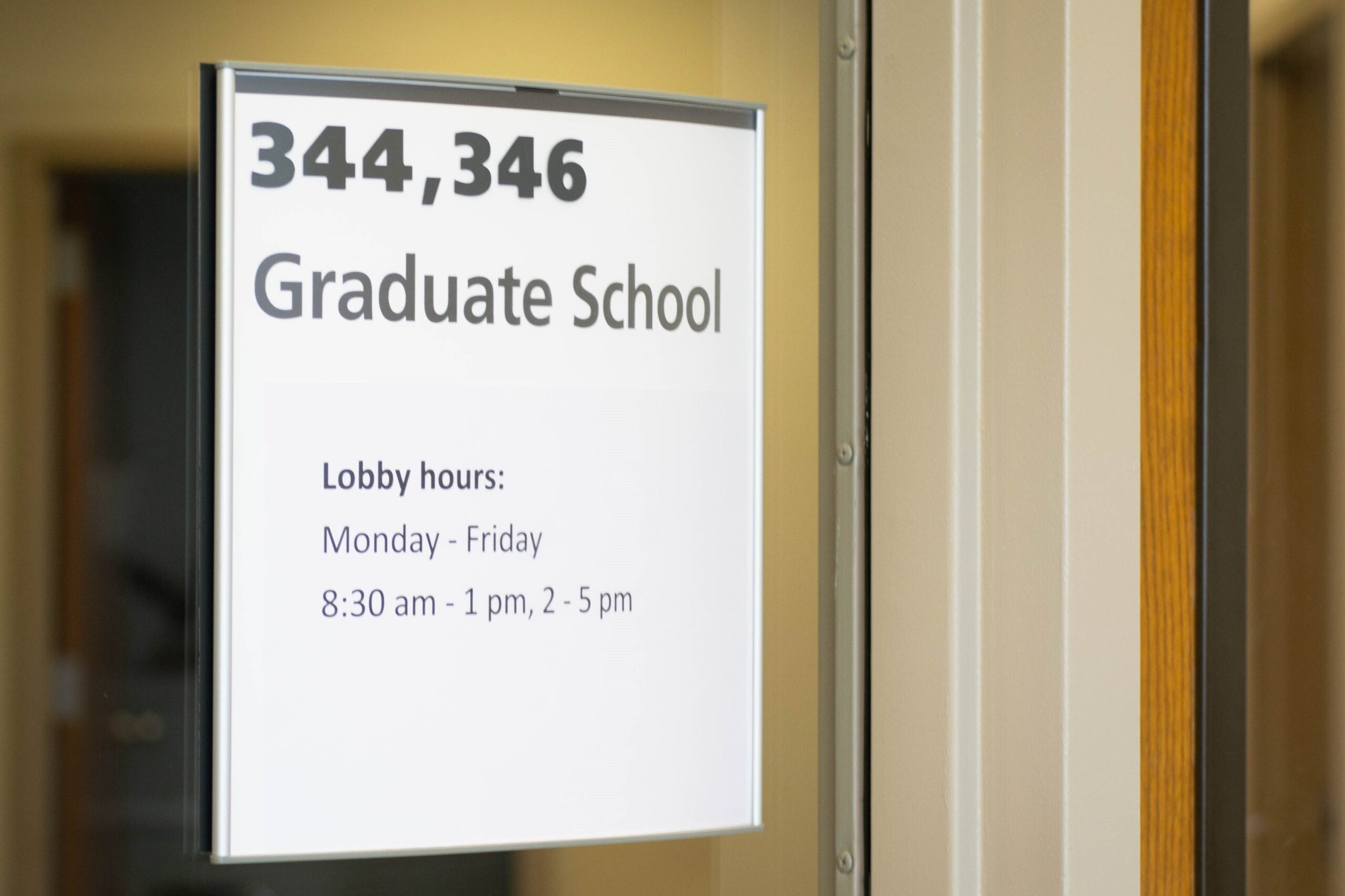
Graduate School Office | Photo by Caitlin Shatsby | The Wright State Guardian
Wright State University’s Board of Trustees approved a merger of its graduate school and honors program on Dec. 9, creating a new “College of Graduate Programs and Honors Studies.”
Overview of merger
According to Shu Schiller, interim dean of the graduate school, the newly formed college will introduce new interdisciplinary programs and provide synergy between graduate and honors students through living-learning communities and mentoring.
The university intends to complete the merger in January 2023.
Currently, more than 22% of the university’s honors students continue into a graduate program, according to an Oct. 7 announcement.
According to the university’s provost’s office, reorganizing the units provides a unique opportunity to improve its pipeline programs and services to honors and graduate students.
“The graduate school and the university honors program support the university’s mission by developing intellectual breadth and depth and providing comprehensive academic and social experiences for successful careers and professions,” Schiller said. “Our graduate and honors programs attract high-ability students who share a passion for learning and research and provide an atmosphere that fosters original scholarship and creative inquiry.”
Schiller noted that the new college will have a better financial structure with new positions to support graduate and honors students’ success and career advancement.
The provost illustrated the new structure to the trustees, exemplifying that the current honors program is understaffed.
An associate dean, a new position in the college, will lead graduate and honors programs. The honors coordinator will be filled soon, according to Schiller.
Student opinion
Honors student Makenzie Hoeferlin echoed the concern of understaffing.
“At the current moment, I feel that the honors program, from my experience, does not provide an adequate experience,” Hoeferlin expressed. “In my experience, the honors department is understaffed and overworked.”
Hoeferlin also remarked on struggles with undergraduate research in the current honors program configuration.
“One of the requirements for my honors program is to do research. Throughout my time doing research for my program, my point person for honors in the [School of Social Sciences and International Studies] has been entirely unreachable. But, like I said, this could be a different story for other students.”
Challenges
“We’ve had some challenges in our graduate and honors programs. We have seen a decline in our graduate enrollment, particularly in our domestic and our honors [students],” Amy Thompson, university provost, said.
In Thompson’s presentation, the provost showcased that the university currently has 2,762 graduate and professional students. That number has declined 36% since fall 2015.
Subsequently, there are 797 registered honors students, a 24% decline since 2015.
Schiller said that the graduate school and honors program staff have significant institutional knowledge and strengths in given areas.
The interim dean describes the challenge of the merger as bringing people together to form a high-performing team with a growth mindset but clarifies the challenge is also a great opportunity.
One of Hoeferlin’s concerns is the disruption that may come with a reorganization.
“When combining these two colleges, it may cause more confusion to everyone involved than anything else,” Hoeferlin said. “I would also wonder what else will change with the combination of these two departments. Will scholarships change? Will graduation requirements for honors students change? Is the university just doing this to encourage more honors students to go to graduate school at Wright State?”
Graduate student Thanh Monnin explains that there has always been a disconnect between the graduate school and graduate students.
“I recently met with Dean Schiller at a luncheon to hear student feedback. In the meeting, she seemed very engaged and heard our feedback,” Monnin said. “Asking your consumers, that’s a wonderful start.”
The Student Government Association unanimously approved a resolution supporting the merger on Nov. 22.
In the resolution, which student body president Blake Bailey sponsored, the merger would be unique to any higher-education institution in Ohio and make the program more attractive to prospective students.
“As far as honors classes go, I have enjoyed my honors courses and believe they provide a great experience with smaller class sizes and wonderful professors,” Hoeferlin explained. “I think this move could be beneficial—if it reallocated resources and made it so professors actually had time to work with their honors students. Other than that, I am not really sure what effect combining these schools is going to have.”
College leadership
Once a merger is complete, a dean from a national search in early 2023 will supervise the new college.
Less than a week before the university’s Oct. 7 announcement, the provost announced that Schiller would begin as interim dean of the graduate school effective Nov. 1.
In the same statement, Thompson announced that Barry Milligan, the school’s dean and interim dean since 2017, had decided to return to the faculty. Milligan teaches English at Wright State’s School of Humanities and Cultural Studies.
Previously, Schiller served as chair of the Department of Information Systems and Supply Chain Management and academic director of the Master of Information Systems Program.
